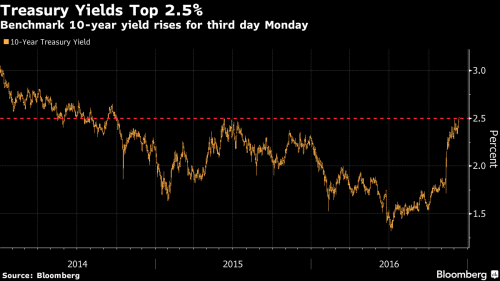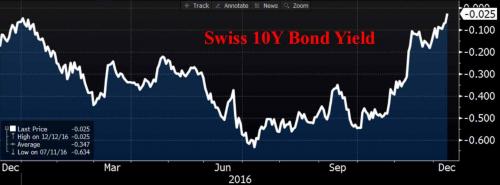The global bond rout returned with a bang, sending 10Y US Treasury yields as much as six basis points higher to 2.53%, the highest level in over two years. The selloff happened as oil prices surged by more than 5% following Saturday’s agreement by NOPEC nations agreed to slash production, leading to rising inflation pressures. At last check, the 10Y was trading at 2.505%, up from 2.462% at Friday and on track for its highest close since September 2014, according to Tradeweb.

“There’s been some pretty decent cheapening across global bond markets,” said Craig Collins, managing director of rates trading at Bank of Montreal in London. The spike in oil prices since OPEC announced a cut in output has led to further cheapening, while in Europe “you had the ECB last week, all contributing to the steepening that we’ve seen.”
Japanese bond yields jumped, while Eurozone bonds were weaker across the board, too, with the yield on 10-year German debt up 0.05 percentage point at 0.392%. Germany’s yield curve, as measured by the spread between two- and 30-year bonds reached the steepest since 2014, based on closing prices, while a similar gauge for Japan widened for a fifth day. U.K. 10-year yields climbed three basis points to 1.48 percent, while those on similar-maturity bunds also added four basis points, to 0.40 percent
Even that bastion of negative rates, Switzerland, saw yields spike, fast approaching the psychological 0% barrier.

“It does seem to be oil-driven, but clearly the bearish sentiment around fixed income prevails,” Mitul Patel, head of interest rates at Henderson Global Investors, said Craig Collins.
Another fundamental catalyst behind the bond weakness remains uncertainty over Trump’s policies: the rise in oil process adds to a general selloff in government bonds that gathered pace following the election of Donald Trump in November. Investors expect Mr. Trump’s policies of cutting taxes and increasing infrastructure spending to lead to higher growth and inflation. Those policies may also encourage the U.S. Federal Reserve to raise interest rates at a faster clip than previously expected, which would likely hit bonds. The Fed is expected to raise interest rates at its meeting this week for the first time in a year.









Leave A Comment